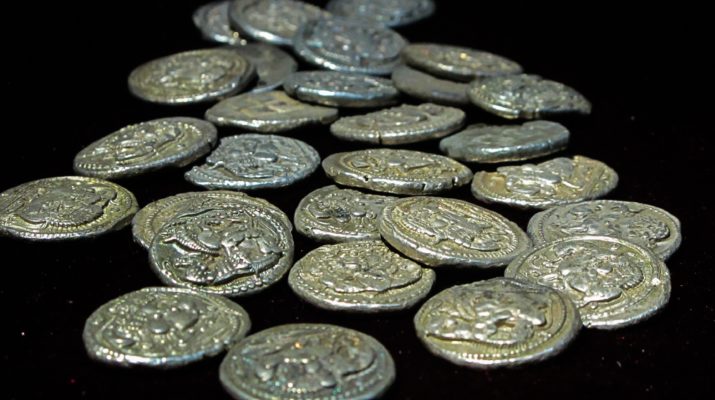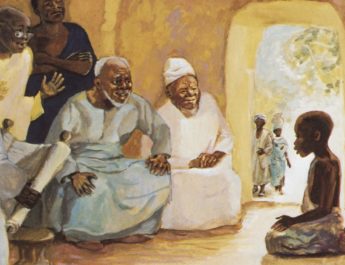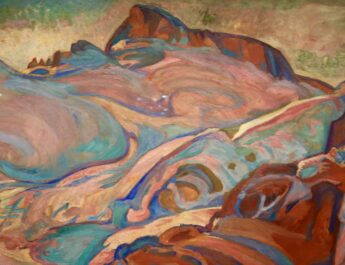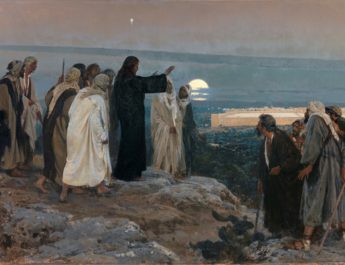Psalm 49:1-2, 5-9, 16-17
A Women’s Lectionary 32
To the leader.A Of the Korahites.B A Psalm.C
A “leader” = natsach. Properly, something that glitters from a distance. So, something that stands out, excels, has status/standing (such as a chief musician or superintendent of Temple services). This can also mean to be permanent or enduring.
B “Korathites” = ben + Qorach. Literally, “sons of Korah.” Ben is from banah (to build or obtain children). This is son, age, child. It is son in a literal or figurative sense. Qorach is from qarach (to shave bald, perhaps frozen). This is Korah, perhaps meaning “ice,” “frost,” “hail,” or “baldness.” See https://www.abarim-publications.com/Meaning/Korah.html
C “Psalm” = mizmor. From zamar (making music; used specially of music to worship God; music with singing, singing praise, singing psalms); may be from zamar (to trim or prune). This is a melody or a psalm.
1 HearD this, allE you peoples;F
D “hear” = shama. This is to hear, call, consent, or consider. It implies listening intelligently, giving attention, and, because of these two factors, obedience and action are often implied.
E “all” = kol. From kalal (to complete). This is all or every.
F “peoples” = am. From amam (to darken, hide, associate; creating shadows by huddling together). This is people or nation. It can be used specifically for a tribe, collectively of troops or armies, or figuratively to refer to a flock of animals.
give ear,G all inhabitantsH of the world,I
G “give ear” = azan. Perhaps from ozen (ear, hearing, audience, show; properly, broadness – applied to its ear in reference to its shape). Properly, this is to expand or broaden one’s ear i.e. listen intently, pay attention, heed.
H “inhabitants” = yashab. This is to sit and so to remain and so to dwell. It is sitting for any reason – as a judge, in order to ambush, or just sitting quietly. Causatively, this can mean settling or marrying. This can also mean continue, endure, or establish.
I “world” = cheled. 5x in OT. Root may mean to glide along quickly. This is life or a lifetime as a short length of time. It can also be an age, duration, or the world – all as transient.
2 both lowJ and high,K
richL and poorM together.N
J “low” = ben + adam. Ben is the same as “Korathites” in superscript. See note B above. Adam is perhaps from adam (to be red, make ruddy); related to adamah (ground, dirt, earth). This is man, humankind, also Adam’s name. It refers to a human individual or humanity.
K “high” = ben + ish. Ben is the same as “Korathites” in superscript. See note B above. Ish is perhaps from enosh (human, humankind, mortal); from anash (to be weak, sick, or frail). This is man, husband, another, or humankind.
L “rich” = ashir. From ashar (to be rich, gain, accumulate). This is rich in a literal or figurative sense. It can also be noble or a rich person.
M “poor” = ebyon. From abah (to consent, obey, want, yield, accept). This is needy, poor, beggar. Someone who is wanting.
N “together” = yachad. From yachad (to join, be united). This is a unit, both, altogether, unitedness, alike.
5 Why should I fearO in timesP of trouble,Q
when the iniquityR of my persecutorsS surroundsT me,
O “fear” = yare. This is to fear, be afraid, dreadful. It can also refer to fearful reverence – to fear in a moral sense is to say to revere, respect.
P “times” = yom. Root may mean being hot. This is the day in a literal or figurative sense. It can also mean birth, age, daylight, continually or other references to time.
Q “trouble” = ra’. From ra’a’ (to be evil, bad, afflict; properly, to spoil – to destroy by breaking into pieces; figuratively, to cause something to be worthless; this is bad in a physical, social, or moral sense; that which displeases, to do harm or mischief, to punish or vex). This is bad, disagreeable, that which causes pain, misery, something having little or no value, something that is ethically bad, wicked, injury, calamity. This refers to anything that is not what it ought to be – a natural disaster, a disfigurement, an injury, a sin.
R “iniquity” = avon. Perhaps related to avah (to bend, twist, be amiss). This is sin, mischief, guilt, fault, punishment for iniquity, or moral evil.
S “persecutors” = aqeb. 1x in OT. From the same as aqeb (heel, hind part, hoof, rear guard of an army, one who lies in wait, usurper). This is one who over-reaches or lies in wait – an enemy.
T “surrounds” = sabab. This is turning around, going around; to surround, cast, walk, fetch. It is to revolve or border in a literal or figurative sense.
6 those who trustU in their wealthV
and boastW of the abundanceX of their riches?Y
U “trust” = batach. This is to hide for refuge, be secure or sure. Figuratively, it refers to trust, being confident, or hoping.
V “wealth” = chayil. From chul (to be firm, strong, prosperous; to endure). This is strength, wealth, ability, activity. It can refer to soldier or a company of soldiers as well as goods. It is a force of people, means, or goods. It can speak of valor, virtue, or strength.
W “boast” = halal. This is to be clear – it originally referred to a sound, then a color. It was to shine and then make a show or boast then to rave. In a causative sense it came to mean celebrate, give glory, sing praise, or be worth of praise. Because of the celebratory nature of the word, it could also mean to give in marriage. This is where Hallelujah comes from.
X “abundance” = rob. From rabab (to be or become much or many, multiply). This is any kind of abundance.
Y “riches” = osher. Related to “rich” in v2. From ashar (see note L above). This is fortune or wealth.
7 Truly, noZ ransom availsAA for one’sBB life;CC
Z {untranslated} = ish. Same as “high” in v2. See note K above.
AA “truly…ransom avails” = padah + padah. Padah is to sever, which is to say to ransom. To secure someone’s release (by paying their debt to free them from slavery) and thus redeem, rescue, deliver, preserve. Can also be the redemption price. The word is repeated twice – the first time as an Infinitive Absolute. The Infinitive Absolute serves to emphasize the sentiment of the word. It is rather like Foghorn Leghorn’s speech pattern, “I said, I said.”
BB “one’s” = ach. This is brother, kindred, another, other, like. It is literally brother, but it can also be someone who is similar, resembling, or related to.
CC Perhaps this could be translated, “no one can ransom a brother.”
there is no priceDD one can giveEE to GodFF for it.
DD “price” = kopher. 17x in OT– including covering Noah’s ark with pitch in Genesis 6. From kaphar (to appease, cover, pacify, cancel, cleanse, pardon). This is ransom, bribe, price of a life. Properly, it means something that covers something else. S, it can be a village, bitumen as a coating, a henna plant that dyes, or a ransom price.
EE “give” = natan. This is to give, put, set, offer. It is to give literally or figuratively.
FF “God” = Elohim.
8 For the ransomGG of lifeHH is costlyII
and can neverJJ suffice,KK
GG “ransom” = pidyom. Related to “truly…ransom avails” in v7. 3x in OT. From padah (see note AA above). This is a ransom or redemption.
HH “life” = nephesh. Related to naphash (to refresh or be refreshed). This is soul, self, person, emotion. It is a breathing creature. Can also refer to appetites and desires.
II “is costly” = yaqar. 11x in OT. This is to be precious, costly, rare, valued; properly, to be heavy; figuratively, valuable or inhibit.
JJ “never” = olam. This is a long scope of time whether in the past (antiquity, ancient time) or in the future (eternal, everlasting).
KK “can…suffice” = chadal. This is properly to be flabby – it implies, to stop, fall, end, rest, leave alone, forsake, or desist. Figuratively this can be lacking or idle.
9 that one should liveLL on foreverMM
and never seeNN the Pit.OO
LL “live” = chayah. This is to live or keep alive in a literal or figurative sense. So, it an be revive, nourish, or save.
MM “forever” = netsach. Related to “leader” in superscript. From natsach (see note A above). This is properly a goal or destination as the bright focus to which one journeys. It can be splendor, truthfulness, or confidence. Most often, it refers to everlastingness, always, continually.
NN “see” = raah. This is to see in a literal or figurative sense so stare, advise, think, view.
OO “Pit” = shachath. From shuach (to bow or sink down in a literal or figurative sense, humble). This is ditch, trap, grave, or hole. Figuratively, it could be destruction or corruption.
16 Do not be afraid when somePP become rich,QQ
when the wealthRR of their housesSS increases.TT
PP “some” = ish. Same as “high” in v2. See note K above.
QQ “become rich” = ashar. Related to “rich” in v2 & “riches” in v6. 17x in OT. See note L above.
RR “wealth” = kabod. From kabad (to be heavy, weighty, burdensome). This is weighty. Figuratively, glorious, abundant, riches, honor, splendor – a reference to one’s reputation or character. This word is often used to describe God and God’s presence.
SS “houses” = bayit. Related to “Korahites” in superscript. Probably from banah (see note B above). This is house, court, family, palace, temple.
TT “increases” = rabah. This is increasing in any aspect whether quantity, authority, size, quality, greatness, etc.
17 For when they dieUU they will carry nothing away;VV
WWtheir wealthXX will not go downYY after them.
UU “die” = mavet. From muth (to die in a literal or figurative sense). This can be death, deadliness, the dead, or the place where the dead go. It can be used figuratively for pestilence or ruin.
VV “carry…away” = laqach. This is to take, accept, carry away, receive. It can also have the sense of take a wife or take in marriage.
WW {untranslated} = kol. Same as “all” in v1. See note E above.
XX “wealth” = kabod. Same as “wealth” in v16. See note RR above.
YY “go down” = yarad. This is to go down, descend; going down in a literal or figurative sense. It can be going to the shore or a boundary, bringing down an enemy.
Image credit: “Ancient Coins” by Alex Berger, 2012.




